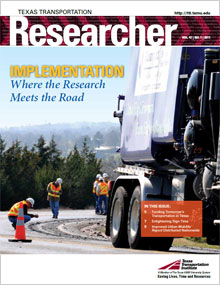
Congestion is bad and getting worse across the country. Space for new lanes is limited, and funding for new construction is nearly nonexistent.
The Washington State Department of Transportation (WSDOT) is familiar with the quandary. Its Interstate 405/State Route 167 corridor is often congested for 10 hours each work day. The high-occupancy vehicle (HOV) lanes are so popular that carpoolers and transit riders no longer receive the travel-time savings and trip-time reliability they’ve come to rely on. The area is projected to grow by 1 million residents over the next 20 years.
Texas Transportation Institute (TTI) Senior Research Engineer Ginger Goodin chaired an expert review panel on WSDOT‘s study of the 30-mile corridor in 2009. The study suggested a system of express toll (or managed) lanes to help ease the congestion.
Express toll lanes would give drivers the option of using existing HOV lanes by paying an adjustable toll to avoid congestion in the general purpose lanes. While designed to reduce overall congestion, express lanes also generate revenue for future corridor improvements. WSDOT planners wanted input on the viability of the plan from national experts.
“We wanted Goodin heading up the team,” Craig Stone, WSDOT toll division director said. “She’s well respected across the country for her knowledge of projects like ours, so we were thrilled she agreed to guide the expert panel.”
Goodin is considered a pioneer in managed lanes research. Working with TTI Senior Research Engineer Beverly Kuhn, she co-led a TTI team in developing foundational guidance for the Texas Department of Transportation beginning in 2000, which has supported the development of numerous managed lanes projects across Texas and the nation.
“The concept of managed lanes was fairly slow to take off,” Goodin explains. “But now most new urban road projects have some element of managed lanes in the plan.”

In addition to Goodin, the expert review panel consisted of Robert Poole, an independent transportation consultant; Chuck Fuhs of Parson Brinckerhoff; Jennifer Tsien of the Florida Turnpike Enterprise; and Janet Lee of Public Resource Advisory Group. Additional expertise was provided by TTI‘s Steve Venglar, Jeff Shelton, Phillip Reeder, Curtis Beaty and Nick Wood, who reviewed the analytical tools and methods WSDOT planners used to develop their plan for the corridor.
The final report addresses four areas of interest, including policy, methodology, phasing and finances. In each case, the panel determined that WSDOT‘s plan was viable. The Washington State Legislature will vote on the issue by spring.
“I think the work we did shows how TTI research can support the development of projects in a very practical way,” Goodin said. “What we brought to the table was a respected technical team of researchers to provide expert review and independent opinion.”
